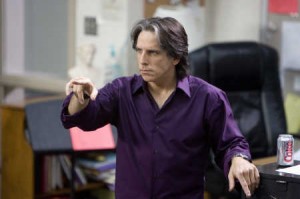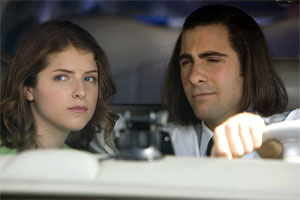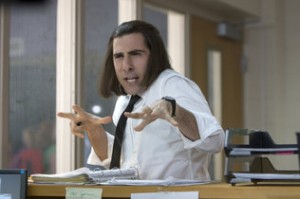The Marc Pease Experience
The best examples of movies that use product placement as plot points are Tsui Hark’s Double Team which amongst other things, has our heroes hide behind a Coke machine, protecting them from certain death and Alexander Payne’s Election, where Matthew Broderick, because he is staring at a can of Pepsi, is able to deduce that he should encourage a potential school president candidate to run for the office. It seems wasteful to have products front and center in a movie, only to pretend they were casually placed in the frame, as opposed to acknowledging their existence. This tactic took some time to perfect, as exemplified by a film like George P. Cosmatos’ Cobra, where Sylvester Stallone spends an inordinate amount of time drinking Coors in the middle of an action scene, and not even noticing that he lives but a few feet from a giant, flashing Pepsi sign (wouldn’t its existence make it hard to sleep?).
Todd Louiso’s The Marc Pease Experience, one of the last few films left in the Paramount Vantage vault before it shut down, takes the Cobra approach to product placement. The movie’s theoretical villain, a phony letch of a high school musical teacher named Jon Gribble, played by Ben Stiller (in a slight departure from his normal two roles, which is either the ridiculous, arrogant, and bizarrely accented idiot or the sap with much contrived slapstick bodily function jokes to befall him), has whole sequences where he slowly drinks a can of Diet Coke or eats a Twizzler as he spits out perfunctory dialogue. Nothing he says seems all that important, just that we understand how tasty the snack is to him (and therefore us). Normally, this sort of quibbling would be pointless nit-picking, movies have to get funded somehow, right? But there’s literally nothing else going on in The Marc Pease Experience to pay attention to. You keep waiting for Gribble’s obsession with junk food to pay off (he’s got a drawer full of candy bars and cases of Diet Coke all over his office), but it doesn’t. And you’d think that because he’s the supposed villain, we wouldn’t think his behavior was something to emulate, but The Marc Pease Experience has absolutely no attitude toward its characters, stuck in the nebulous void between pity and mockery, but never hitting either button.
 This feeling of nothingness could be the result of studio tinkering (The Marc Pease Experience is being released on all of 10 screens, clearly a contractual obligation, and with no advertising of any kind to back it up), the movie is short, choppy, and unfocused, only serving as a way for titular star Jason Schwartzman to further his real-life music career. There’s no connective tissue between any scenes, Pease is a failed acapella singer and high-school scapegoat (Gribble was his teacher who patronizingly encouraged him 8 years previous), now a limo driver, trying to gather money together to get some time in a recording studio to make a demo. His girlfriend, Meg, a high school senior (nothing is made of how creepy their relationship is), doesn’t know what she wants to do in life and either thinks Marc is annoying or supportive, it’s never clear how she feels about him. Their plots have very little to do with each other, which is how the film’s editor(s) seems to have wanted it. The focus of the movie is actually on a schlocky high school performance of The Wiz. Not that we get much of the behind-the-scenes drama, no, we just watch the students act out their parts on stage. It plays like a low-rent concert film (the kid playing The Wizard appears to have been cast for his visual resemblance to Nipsey Russell), the drama of Pease and Gribble battling over Meg’s future or whether or not Gribble will help Pease with the demo is less than secondary. It’s even below the peculiar hairstyle choices made for Stiller and Schwartzman, wherein they wear silly wigs for the entire movie.
This feeling of nothingness could be the result of studio tinkering (The Marc Pease Experience is being released on all of 10 screens, clearly a contractual obligation, and with no advertising of any kind to back it up), the movie is short, choppy, and unfocused, only serving as a way for titular star Jason Schwartzman to further his real-life music career. There’s no connective tissue between any scenes, Pease is a failed acapella singer and high-school scapegoat (Gribble was his teacher who patronizingly encouraged him 8 years previous), now a limo driver, trying to gather money together to get some time in a recording studio to make a demo. His girlfriend, Meg, a high school senior (nothing is made of how creepy their relationship is), doesn’t know what she wants to do in life and either thinks Marc is annoying or supportive, it’s never clear how she feels about him. Their plots have very little to do with each other, which is how the film’s editor(s) seems to have wanted it. The focus of the movie is actually on a schlocky high school performance of The Wiz. Not that we get much of the behind-the-scenes drama, no, we just watch the students act out their parts on stage. It plays like a low-rent concert film (the kid playing The Wizard appears to have been cast for his visual resemblance to Nipsey Russell), the drama of Pease and Gribble battling over Meg’s future or whether or not Gribble will help Pease with the demo is less than secondary. It’s even below the peculiar hairstyle choices made for Stiller and Schwartzman, wherein they wear silly wigs for the entire movie.
 The hair issue highlights another distraction; it is never clear what time period we’re in. Is Stiller’s feathered look supposed to be funny or in style? Is Schwartzman’s ponytail supposed to highlight his overall cluelessness and inability to move on with his life, or is it just the movie’s feeble idea of a joke? The currently mangled state of The Marc Pease Experience is puzzling because there’s no way to even tell what Louiso was after, all evidence of human hands have been removed. It isn’t Louiso’s or the movie’s fault that the studio financing it was shut down or that a writer’s strike interfered with production. But the incarnation of The Marc Pease Experience that the public is [barely] being allowed to view is, instead of being an ad for Coke or Twizzler, rather an ad for cell phones that light up in the dark. So you can check the time to see how much longer you’ll have to be sitting in an empty theater.
The hair issue highlights another distraction; it is never clear what time period we’re in. Is Stiller’s feathered look supposed to be funny or in style? Is Schwartzman’s ponytail supposed to highlight his overall cluelessness and inability to move on with his life, or is it just the movie’s feeble idea of a joke? The currently mangled state of The Marc Pease Experience is puzzling because there’s no way to even tell what Louiso was after, all evidence of human hands have been removed. It isn’t Louiso’s or the movie’s fault that the studio financing it was shut down or that a writer’s strike interfered with production. But the incarnation of The Marc Pease Experience that the public is [barely] being allowed to view is, instead of being an ad for Coke or Twizzler, rather an ad for cell phones that light up in the dark. So you can check the time to see how much longer you’ll have to be sitting in an empty theater.




